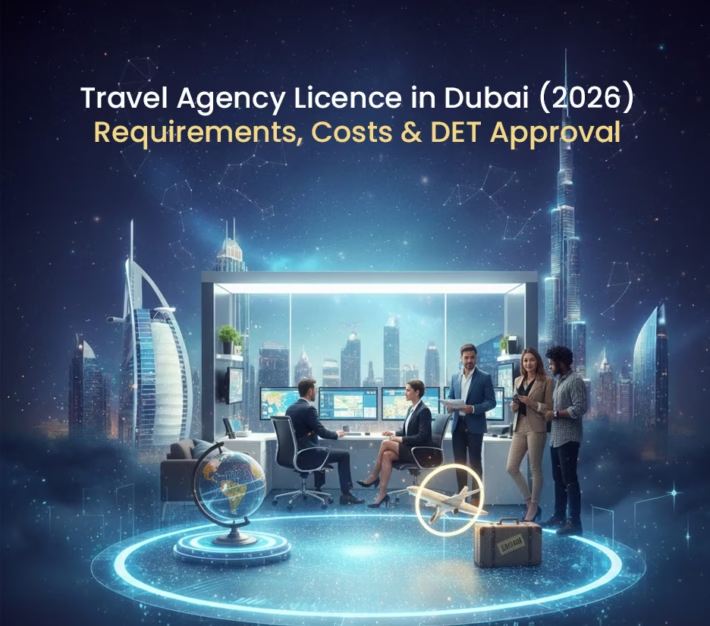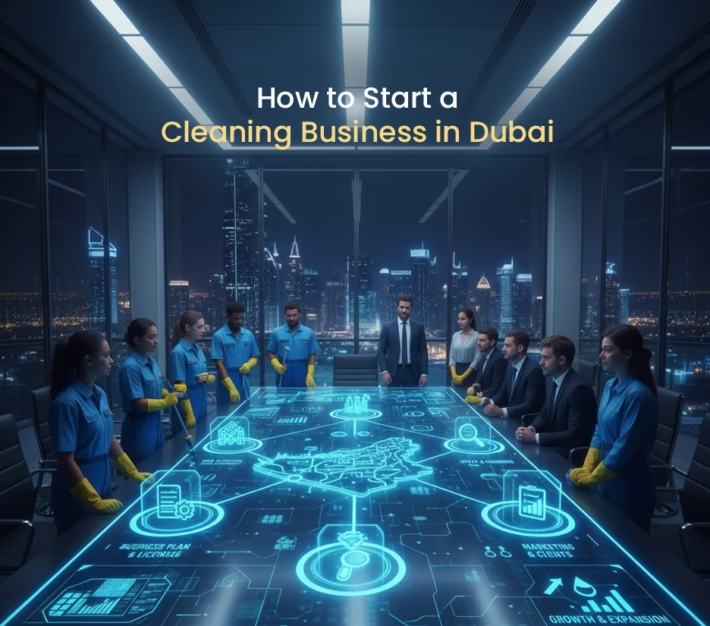Professional License in Dubai 2025: Cost, Requirements and Benefits

Every service professional in Dubai has the same starting point: the moment they decide to take their expertise from idea to practice. The tool that makes this possible is the professional license.
Professional License in Dubai
A professional license in Dubai is more than a regulatory requirement; it’s the official recognition that allows consultants, educators, creative professionals, and specialists to deliver services legally and credibly in the UAE. This license is the bridge between your skills and a thriving client base.
In 2025, with reforms granting 100% foreign ownership in most service sectors and streamlined digital processes, the professional license has become one of the most accessible and impactful ways for individuals and firms to establish themselves in Dubai.
This guide will show you not only the process, but also the practical insights you need to make sure your license supports long-term growth:
- The scope of activities allowed under a professional license
- The differences between mainland and free zone setups
- Step-by-step registration instructions
- Cost breakdowns and renewal requirements
- Expert tips to avoid common mistakes
Understanding the Professional License
A professional license in Dubai is designed for individuals and firms that provide specialized services based on their skills, knowledge, or expertise. Unlike a commercial license, which focuses on the trade of physical goods, the professional license enables service providers to operate legally, invoice clients, and establish credibility in the UAE.
Definition and Scope
The professional license is issued by Dubai Economy and Tourism (DET) for mainland companies and by various free zone authorities for free zone setups. It applies to a wide range of service activities, including:
- Management and business consultancy
- IT and technology services
- Legal and accounting services
- Marketing, media, and design services
- Education and training providers
- Healthcare and wellness professionals
- Freelance and independent specialists
This makes the license a natural choice for entrepreneurs whose business model does not rely on trading goods but on delivering knowledge, creativity, or professional services.
How it Differs from Commercial and Industrial Licenses
| License Type | Purpose | Examples of Activities |
|---|---|---|
| Professional License | Delivering services based on skill or expertise | Consultants, teachers, marketing agencies, IT firms |
| Commercial License | Buying, selling, and trading goods | Retail shops, import and export, wholesale suppliers |
| Industrial License | Manufacturing and production | Factories, assembly plants, large-scale producers |
You might be interested in reading more about
Issuing Authorities
- Mainland: Allows direct access to the UAE market, as well as the ability to work with government entities and large corporate clients.
- Free Zones: Offer 100 percent foreign ownership and streamlined processes, often with attractive packages for freelancers and small to medium enterprises. Examples include Dubai Media City for creative services and IFZA for general consultancy.
- Offshore Options: Rarely used for professional services, as most offshore companies cannot operate directly in the UAE. These are usually for holding or international consulting activities without a local presence.
Typical Permitted Activities
The professional license can be tailored to cover one or more service activities depending on your business plan. Some of the most common include:
- Consulting: Business, management, HR, and IT consultancy
- Education and Training: Coaching centers, skill development, online learning platforms
- Creative Services: Advertising, digital marketing, photography, graphic design
- Health and Wellness: Clinics, therapy practices, nutrition, and fitness services
- Technical Services: Engineering consultancies, software development, IT support
- Freelance Work: Approved Free Zones provide licenses for independent professionals
It is important to select the right activity codes from DET or your chosen free zone authority, as this defines the services you are legally permitted to provide.
Mainland vs Free Zone Professional License
Choosing between a mainland professional license and a free zone professional license is one of the most important decisions for service businesses in Dubai. Each jurisdiction has distinct advantages and considerations.
Mainland
A mainland professional license issued by Dubai Economy and Tourism (DET) allows you to offer services anywhere in Dubai and across the UAE without restrictions. This setup is ideal if you plan to work directly with local clients, government entities, or larger corporations that require a mainland presence. While office space is required, many options exist from coworking desks to larger offices depending on the size of your team.
Free Zone
A free zone professional license provides 100 percent foreign ownership, competitive packages, and simplified processes. This option is especially attractive for consultants, creatives, freelancers, and small service providers. However, free zone businesses that want to serve mainland clients often need to work through a local service agent or open a mainland branch.
Offshore
Offshore structures are not commonly used for professional services since they cannot directly operate within the UAE. They are usually limited to international consulting without a local physical presence.
Step-by-Step Process to Obtain a Professional License
Applying for a Professional License in Dubai requires careful preparation. While the requirements vary slightly between mainland and Free Zone jurisdictions, the general process follows a clear sequence.
Define Your Professional Activity
The first step is to identify the specific service you intend to provide. Both Dubai Economy and Tourism (DET) and Free Zone authorities maintain detailed lists of approved professional activities. Choosing the correct category ensures your license matches your business model and avoids complications later.
Choose Your Legal Structure
For a Professional License, the common legal structures include:
- Sole Establishment: Suitable for individuals offering services under their own name.
- Civil Company: Often used by two or more professionals who want to establish a partnership.
- Limited Liability Company (LLC): Selected in cases where a larger professional practice is required, offering more flexibility in scaling.
You might be interested in reading more about:
- How to Start a Sole Establishment in the UAE
- How to Start a Civil Company in Dubai
- How to Start an LLC Company in Dubai
Mainland setups may require a Local Service Agent (LSA), who has no ownership rights but assists with government liaison. Free Zones, in most cases, do not require an LSA.
Reserve a Trade Name
Submit your preferred business name to DET or your Free Zone authority for approval. The name must comply with UAE naming rules:
- Avoid offensive or religious terms
- Do not duplicate an existing registered name
- Reflect the nature of your services clearly
Once approved, the trade name is reserved for a limited time, during which the rest of your licensing process should be completed.
Obtain Initial Approval
Initial approval confirms that your chosen activity is permitted. For mainland licenses, this step is completed through DET. Free Zone authorities issue their own approvals digitally, often within a few business days.
Arrange Office Space
Mainland Professional Licenses require a physical office or coworking arrangement with an Ejari tenancy contract. Free Zones often offer flexi desk or coworking packages that satisfy the office requirements.
Prepare and Submit Documents
The required documents generally include:
- Passport copies of shareholders and partners
- Recent passport photographs
- Valid UAE residence visa and Emirates ID, if applicable
- Trade name reservation certificate
- Initial approval certificate
- Tenancy contract and Ejari registration (mainland only)
- Local Service Agent agreement (if required)
- Professional qualifications or certifications for certain activities
Pay the License Fees
License fees vary by jurisdiction and activity type. Mainland Professional Licenses typically range from AED 8,000 to AED 18,000, while Free Zone packages can start around AED 10,000 to AED 15,000, depending on the authority and visa quota.
Receive the Professional License
Once the documents are reviewed and fees are paid, the license is issued digitally. Free Zones usually provide electronic licenses by email, while DET issues can be accessed through their online system.
Complete Post License Formalities
After obtaining your Professional License, you may need to:
- Open a corporate bank account
- Apply for residence visas for yourself, employees, and dependents
- Register for VAT if your annual turnover exceeds AED 375,000
- Obtain any external approvals required for specialized services (for example, Dubai Health Authority approval for healthcare practices)
Costs of a Professional License in Dubai
One of the first considerations for professionals setting up in Dubai is cost. The total investment depends on the jurisdiction, the type of activity, the number of visas, and office requirements. Below is a practical breakdown to help you plan effectively.
Mainland Cost Breakdown
For mainland Professional Licenses issued by Dubai Economy and Tourism (DET), the main expenses include:
- Trade Name Reservation: AED 600 to AED 1,000
- Initial Approval Certificate: AED 1,000 to AED 1,500
- Professional License Fee: AED 6,000 to AED 12,000
- Ejari Tenancy Contract: AED 1,000 to AED 2,000
- Local Service Agent (if required): Annual service fee varies (commonly AED 3,000 to AED 6,000)
- Notarization and Admin Fees: AED 1,000 to AED 2,000
The figures above are estimated costs, with the Mainland total ranging from AED 8,000 to AED 18,000, excluding visas and health insurance.
Free Zone Packages
Free Zones in Dubai offer bundled packages for service professionals that typically include the license, coworking or flexi desk space, and visa quotas. Average packages are:
- IFZA: From AED 11,500
- Dubai Media City: AED 15,000 to AED 18,000, ideal for creative and media services
- Meydan Free Zone: From AED 12,000, popular among consultants and trainers
- Dubai South: Around AED 13,000, often chosen by education and training providers
Hidden and Additional Costs
Beyond the basic license, professionals should budget for:
- Visa Application Fees: AED 3,000 to AED 5,000 per visa
- Mandatory Health Insurance: Starting from AED 1,500 annually
- External Approvals: For specialized fields such as healthcare or legal services
- Corporate Bank Account: Some banks require a minimum balance ranging from AED 10,000 to AED 50,000
Renewal and Ongoing Compliance
Annual renewal fees are generally similar to initial setup costs, excluding one‑time fees like notarization. Professionals must also renew Ejari leases, employee visas, and health insurance policies.
Budget Scenarios
Freelance Consultant
- Free Zone license with 1 visa: AED 11,500 to AED 14,000
- Visa and health insurance: AED 4,500 to AED 6,000
- Annual Estimate: AED 16,000 to AED 20,000
Small Consultancy Firm (2–3 Employees)
- Mainland license: AED 14,000 to AED 18,000
- Ejari lease: AED 8,000 to AED 12,000
- 3 visas: AED 12,000 to AED 15,000
- Annual Estimate: ~AED 35,000 to AED 45,000
Specialized Professional Practice (Healthcare, Legal, or Education)
- Mainland license: AED 18,000+
- External approvals: AED 5,000+
- Office or clinic lease: AED 30,000+
- Multiple visas: AED 20,000+
- Annual Estimate: AED 75,000 to AED 120,000+
Calculating the full cost often leaves professionals uncertain about hidden fees or compliance requirements. This is where EZONE, one of the best business setup service providers in the UAE, adds real value, providing a clear breakdown from the start so your budget matches your business plan without surprises.
Renewal and Compliance
Getting a professional license in Dubai is only the first step. To keep your services running legally, you must stay on top of trade license renewal and compliance requirements. Missing a deadline or overlooking a document can result in fines, operational delays, or even license suspension.
Annual Renewal Process
Professional Licenses are valid for one year and must be renewed before expiry. The process usually involves:
- Submit the renewal application to DET or your Free Zone authority
- Providing an updated Ejari tenancy contract (for mainland offices)
- Paying the renewal fees
- Ensuring all employee visas and Emirates IDs are valid
Most Free Zones allow digital renewals. For mainland companies, many professionals choose to work with EZONE advisors, who manage the paperwork efficiently and ensure renewals are completed on time.
Updating Activities and Ownership Details
During renewal, you may update your license if your services have expanded or changed. This includes:
- Adding or removing activities
- Updating shareholder or partner information
- Amending office or contact details
Submitting incorrect or incomplete updates can cause delays. Having EZONE specialists review and file updates helps avoid penalties and ensures compliance.
VAT Registration and Tax Compliance
If your annual turnover exceeds AED 375,000, you must register for VAT. Even if your turnover is lower, voluntary registration may strengthen your credibility with corporate clients.
Since 2023, corporate tax rules also apply in certain cases, so keeping accurate financial records and seeking professional advice is increasingly important.
Auditing and Reporting Obligations
- Mainland Professional Licenses often require annual audited accounts for renewal.
- Free Zones such as DMCC and Dubai Media City also request audited financial statements.
- Smaller Free Zones may not require audits, but still expect accurate bookkeeping.
Common Mistakes to Avoid
- Allowing Ejari contracts to lapse before renewal
- Overlooking VAT or tax filing obligations
- Waiting until the final week of license expiry to begin the process
- Failing to settle fines or penalties before renewal
Benefits of a Professional License
A Dubai Professional License offers much more than the ability to operate legally. For service providers, it delivers credibility, flexibility, and access to a fast‑growing market.
Legal Recognition and Credibility
Holding a professional license confirms that your business is recognized by the UAE authorities. This is essential for building client trust, signing contracts, and opening a corporate bank account.
Full Ownership Opportunities
In most service sectors, foreign professionals can now enjoy 100 percent ownership of their mainland businesses. Free Zone setups continue to provide complete ownership as well.
Access to the UAE Market and Beyond
- Mainland licenses allow direct access to Dubai and the wider UAE market.
- Free Zone licenses open doors to international clients and provide a cost‑effective base for global operations.
Visa Sponsorship
A professional license enables you to sponsor residence visas for yourself, your employees, and your dependents, creating stability for your professional practice.
Cost Efficiency Compared to Commercial Licenses
In many cases, professional licenses have lower government fees than commercial licenses, especially for individuals or small teams providing services rather than trading goods.
Opportunities for Growth
Professional license holders can bid for consultancy contracts, apply for tenders, and establish long-term relationships with clients across industries.
Flexible Setup Options
From coworking spaces in free zones to traditional offices on the mainland, the Professional License allows you to scale your setup based on your current needs and future growth.
Strategic Support
While the benefits are clear, taking full advantage of them often depends on making the right setup decisions from the start. Many professionals turn to EZONE advisors to ensure their license not only meets compliance requirements but also supports their business goals most effectively.
Common Challenges and How to Overcome Them
- Choosing the Wrong Activity
Selecting an activity that does not fully match your services can cause problems later, including the need for amendments or additional approvals. - Document Preparation Delays
Incomplete or incorrectly prepared documents are a common cause of delays in both mainland and Free Zone applications. - Trade Name Rejections
Names that conflict with existing registrations or violate UAE naming rules are often rejected. - Underestimating Total Costs
Many professionals budget only for the license fee, forgetting additional expenses such as visas, Ejari, or health insurance. - Banking Difficulties
Opening a corporate bank account can be challenging if documents do not fully align with compliance requirements. - Renewal Oversights
Late renewals, unpaid fines, or expired tenancy contracts can lead to penalties or operational freezes.
Conclusion
In Dubai, a professional license is not simply a formality. It is the step that defines how you will deliver your expertise, who you can work with, and how clients will view your credibility.
The reforms of 2025 have made entry easier, but success still depends on choices made at the beginning, the activities you register, the jurisdiction you select, and the way you manage renewals and compliance. Many professionals discover too late that small missteps in these areas can limit opportunities or increase costs.
At EZONE, we believe your focus should stay on your profession, not on deciphering procedures. That is why our role goes beyond applications: we help you build a setup that fits your goals today and keeps you prepared for tomorrow.
A professional license is not just the right to work. It is the signal that your skills are ready to be taken seriously. The only question is how you choose to set the terms.
FAQs about Dubai Professional License
Yes. Most service activities in Dubai now allow 100 percent foreign ownership on the mainland, and Free Zones have always offered full ownership.
For many mainland setups, a Local Service Agent is still required. The LSA does not own any part of the business but acts as a local representative for government procedures. In Free Zones, no LSA is required.
Typically between 3 and 7 business days for a professional free zone license if documents are complete.For mainland, it takes usually 1 to 3 weeks, depending on external approvals and tenancy registration.
Yes, but they must fall under related categories approved by DET or the Free Zone authority. Some Free Zones are more flexible with bundling services.
Yes. Health insurance is mandatory for all visa holders, and proof is required during the application process.
Yes. Licenses must be renewed annually to remain valid. Late renewals can result in penalties or service suspensions.
Yes. Most banks require a valid license, tenancy agreement, and shareholder documents. Some may also ask for a simple business plan or proof of qualifications.
Many professionals prefer to work with EZONE business advisors, who handle the entire process from activity selection to document submission and renewals, saving time and avoiding costly mistakes.
EZONE specialize in creating content that highlights business setup and consultancy services. We provide expert insights on company formation, licensing, and the latest industry developments. Through this blog, we aim to equip entrepreneurs and businesses with the knowledge they need to navigate opportunities and challenges in today's market.



